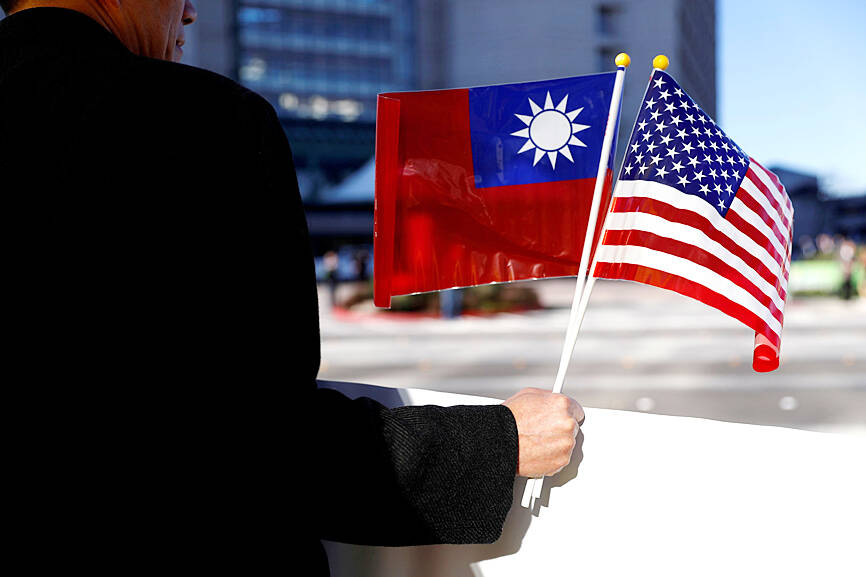The US agency tasked with driving scientific research has launched a program to connect US start-ups with their Taiwanese peers, backing Taiwan’s ambitions to foster key players in strategic sectors such as semiconductors, artificial intelligence (AI) and beyond.
The National Science Foundation (NSF) — one of the US federal government’s biggest outfits for funding research — is for the first time sponsoring a series of workshops abroad to help US start-ups work with their overseas counterparts. It chose to begin in Taiwan, which plays an increasingly pivotal role in chips and the technology supply chain.
The Ministry of Economic Affairs is backing the effort, which aims to discover and finance firms exploring “deep tech,” or cutting-edge arenas, including biotechnology and quantum computing.

Photo: Reuters
The US agency intends to expand the program to other nations over time, NSF Director Sethuraman Panchanathan told Bloomberg News.
While many of history’s most successful start-ups — including the likes of Nvidia Corp — began in the US, the bulk of hardware innovation now centers on Asia.
Taiwan Semiconductor Manufacturing Co (TSMC, 台積電) alone makes about 90 percent of the most advanced logic chips.
The US Department of Commerce has awarded TSMC US$11.6 billion of grants and loans to build three plants in Arizona, underscoring its pivotal industry role.
“You just can’t do everything on your own or within the United States. You have supply chains and other things that are global,” said Michelle Kiang (江夢熊), the cofounder of Impact Science Ventures who helped the US agency conceive the program.
She devised the program with David Horsley, a Northeastern University professor and chip researcher.
“So you want to invest in those relationships early and also in different ways, so that these start-ups out of the United States are able to build a very strong global supply chain as well as a global business to continue to fuel the growth of the US economy,” Kiang said.
Taiwan’s technology start-ups have struggled to raise funds the way their counterparts in Silicon Valley do. The government is looking to change that, National Science and Technology Council Minister Wu Tsung-Tsong (吳政忠) said.
One of his missions is to help bridge the gap between academia and industry, not unlike the US foundation. The council is also keen on attracting more overseas talent, such as through a contest for global technology start-ups to be announced next month that would offer the winners a chance to turn their ideas into reality with Taiwanese companies, including TSMC.
Last year, the government launched the Taiwan Chip-based Industrial Innovation Program with a US$10 billion budget over 10 years.
“For Taiwan, manufacturing plays a very important role, but for innovations in different areas, we are still on the starting step,” Wu told Bloomberg News. “We think that if a lot of talent comes to Taiwan, then capital will come.”

CHAOS: Iranians took to the streets playing celebratory music after reports of Khamenei’s death on Saturday, while mourners also gathered in Tehran yesterday Iranian Supreme Leader Ayatollah Ali Khamenei was killed in a major attack on Iran launched by Israel and the US, throwing the future of the Islamic republic into doubt and raising the risk of regional instability. Iranian state television and the state-run IRNA news agency announced the 86-year-old’s death early yesterday. US President Donald Trump said it gave Iranians their “greatest chance” to “take back” their country. The announcements came after a joint US and Israeli aerial bombardment that targeted Iranian military and governmental sites. Trump said the “heavy and pinpoint bombing” would continue through the week or as long

TRUST: The KMT said it respected the US’ timing and considerations, and hoped it would continue to honor its commitments to helping Taiwan bolster its defenses and deterrence US President Donald Trump is delaying a multibillion-dollar arms sale to Taiwan to ensure his visit to Beijing is successful, a New York Times report said. The weapons sales package has stalled in the US Department of State, the report said, citing US officials it did not identify. The White House has told agencies not to push forward ahead of Trump’s meeting with Chinese President Xi Jinping (習近平), it said. The two last month held a phone call to discuss trade and geopolitical flashpoints ahead of the summit. Xi raised the Taiwan issue and urged the US to handle arms sales to

State-run CPC Corp, Taiwan (CPC, 台灣中油) yesterday said that it had confirmed on Saturday night with its liquefied natural gas (LNG) and crude oil suppliers that shipments are proceeding as scheduled and that domestic supplies remain unaffected. The CPC yesterday announced the gasoline and diesel prices will rise by NT$0.2 and NT$0.4 per liter, respectively, starting Monday, citing Middle East tensions and blizzards in the eastern United States. CPC also iterated it has been reducing the proportion of crude oil imports from the Middle East and diversifying its supply sources in the past few years in response to geopolitical risks, expanding

Pro-democracy media tycoon Jimmy Lai’s (黎智英) fraud conviction and prison sentence were yesterday overturned by a Hong Kong court, in a surprise legal decision that comes soon after Lai was jailed for 20 years on a separate national security charge. Judges Jeremy Poon (潘兆初), Anthea Pang (彭寶琴) and Derek Pang (彭偉昌) said in the judgement that they allowed the appeal from Lai, and another defendant in the case, to proceed, as a lower court judge had “erred.” “The Court of Appeal gave them leave to appeal against their conviction, allowed their appeals, quashed the convictions and set aside the sentences,” the judges